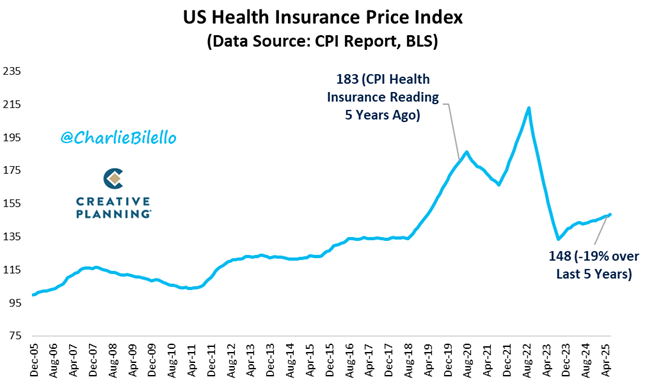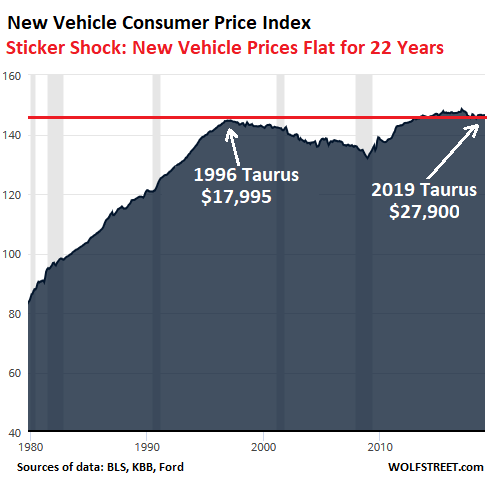The Consumer Price Index is taken as a proxy for how much consumers pay for goods and services. It isn’t, for a wide variety of reasons. Here’s another:

This is a component of overall CPI, but what it tracks is actually retained earnings. The justification is that if retained earnings are down, more of premiums are being spent on healthcare! Of course you don’t care about that, what you care about is how much your insurance costs.
Now there might be some technical argument for this IF all the other components of medical care costs were tracked accurately, but like everything else they are subject to hedonic adjustments and various other hand waving.
As a reminder, hedonic adjustments lead to conclusions like “there was recently a 20 year period during which car prices didn’t rise.”

I will be clearer, the US economy has been shrinking for some time. I’m not sure how long because the numbers are so poisoned it’s impossible to tell. The maximal case is since the early 90s recession (hedonomic adjustments for computers were off the charts, but the evidence finds no overall increase in productivity from computers.) The “almost for sure” case is from the financial crisis, so late 2007.
Almost everyone in the US is worse off, surveys find that two-thirds of Americans can’t afford a decent lifestyle and wealth is shrinking for everyone except the top 1%. This is all concealed by bullshit top line economic statistics.
Properly accounted for I doubt if the American economy is half the size of China’s, and where it matters (manufacturing and resources) it’s probably closer to a third the size. No, “will you have fries with that” and “my job is to write 1,000 page reports” jobs do not count. The second in particular is actively detrimental to the real economy, as is essentially everything done by finance, crypto, and at least half of what American tech companies do.
As I’ve noted before, Trump is accelerating the decline. We’ll go back to Trump’s “unique accelerationist genius” soon.
If you’ve read this far, and you read a lot of this site’s articles, you might wish to Subscribe or donate. The site has over over 3,500 posts, and the site, and Ian, take money to run.

Jan Wiklund
There is also a fairly good argumentation along these lines (but a little longer, of course) in Peter Turchin: End times.
StewartM
Charlie Bilello, the Youtuber that is making these claims, also says that gas prices have increased 54.8 %. At the very least that’s misleading, as 2020 saw a dip in gas prices due to COVID.
Historically, gas prices have been relatively flat if actually not declining.
https://inflationdata.com/articles/inflation-adjusted-prices/inflation-adjusted-gasoline-prices/
And I can confirm this just by looking at signs on the street. Right now I’m seeing gas prices at $2.52 a gallon, and sometimes even lower. I don’t recall them being much lower during 2020.
Ian Welsh
He’s wrong about gas prices and right about health care prices.
See also: https://www.ianwelsh.net/why-economists-are-wrong-about-how-good-the-economy-is-and-regular-people-are-right/
Oakchair
In quantum physics an observer, through the act of observing causes a particles wave function to collapse and changes the physical reality of the particle. In quantum physics you do not see what you’re looking at, you only see what is there after your act of observing has changed it.
Goodharts law is the version of this applied to economic and social measurements.
“Any observed statistical regularity will tend to collapse once pressure is placed upon it for control purposes.” or the more common definition “When a measure becomes a target, it ceases to be a good measure.”
I think my major critique of dystopias such as 1984 is that they are so blunt and obvious. The chocolate ration increasing from 30 grams to 20 grams is recognized as dystopian. Whereas what goes on currently is just shrugged off.
At this point the problem isn’t that the data, and statistics are unreliable. It’s not even that people think they are reliable. The problem is that people won’t even consider that what the the marketing arm of the ruling class –the experts– tells them could be complete bullshit.
marku52
The Taurus one kills me. How they can print that one with a straight face. Also, occasionally the “experts” will tell us that health care only went up 4% in a year.
LOL
“The problem is that people won’t even consider that what the the marketing arm of the ruling class –the experts– tells them could be complete bullshit.”
I think the government’s handling of Covid “If you get this shot you won’t get sick and you won’t give it to Grandma”, amongst other lies (“You aren’t a horse! Safe and Effective!), went a long way to destroying this. At this point we are seriously into late Soviet thinking of “Believe nothing until it is officially denied”. At least I know I am.
StewartM
Health care pricing is a black hole.
With insurance, Trump 1.0 allowed non-marketplace plans to come back:
https://www.healthcare-management-degree.net/faq/what-changes-have-been-made-to-the-aca-under-the-trump-administration/
Return of “Skinny” Insurance Plans
With the initial enactment of the ACA, health insurance policies had to have minimum levels of coverage. Pursuant to the ACA, short-term policies with less coverage could only be used to a consumer for three months.
The Trump Administration changed the availability of these “skinny” policies. A consumer can now have a skinny policy for 364 days. When that initial time period lapses, a consumer can renew a skinny policy for up to three more years.
What this meant was:
a) While individuals and families would get cheaper prices for insurance premiums, they would have to pay even more out-of-pocket for real care. This is especially true when various medical preventive procedures that are covered with no cost to the patient under the ACA now have to be paid for. By buying a out-of-network plan, the premiums may be cheap, but from what I’m seeing if you actually have to have a procedure it will cost you lots of moola because almost very little seems to be actually covered.
b) because the insurance pool for ACA marketplace plans is then smaller, ACA plans have to charge more. This means the non-ACA plans can also gouge for more profit.
c) As many predicted, the lack of any public option meant insurers divided up states between them to eliminate competition altogether. My red state is one such example; we have four insurers but each of the four have locked down areas of the state as being ‘in-network’ and everything thing else is ‘out-of-network’. So you really only have one choice.
d) I’m wondering about other rule changes have been made. I am now on Medicare and now for a preventative procedure that should be covered at no cost to the patient I’m getting bills from other components of the procedure (the testing labs, the anesthesiologist, etc) that one should think should be included in the bill. It’s not just insurers gouging us, it’s the providers too.
But if we’re going to disparage government statistics and elevate personal experience, here’s mine.
1985 car prices when I started my company job, inexpensive car: c. $5000
1988 car price for my very first car (inexpensive): $8700
2004 car price for my second car (inexpensive; still driving it today): $15600
New car prices today for same type cars today: c. $20,000-23,000
I calculate a 74 % jump in the 1980s, and a 312 % jump to 2004. But only a 38 % jump over the last 21 years, which works out to a 1.8 % a year. That’s pretty flat.
My food prices have been relatively stable the past several years, despite the media ‘chatter’. My gas prices ditto. My utility prices since I’ve owned my home have about doubled over the past 22 years, but that’s hard to fathom as it depends on usage and the number of people in my dwelling has changed over the years.
Computer prices? Fallen, even without hedonics. The very first computer I bought in 1995 was almost $2500; the most recent one in 2021 and it was about $1600 (despite having 8 cores and 64 GB of RAM).
Where I do see very serious problems are with healthcare, as we mention, but most urgently, with housing. And I fully agree with you on the latter cause, we’ve let private equity buy up all the housing to turn them into rental units. I just got back from the state of my birth, and there private equity is really pushing hard, and charging rents five times greater than what I’m paying for my mortgage!! I get notices from these vultures every day offering me to pay above market price for my home, and they go into the trash can pronto.
But most things, the inflation was greater under Reagan. Rents shot up during Reagan’s first term where I lived by a factor of three in just the first two years! But all the media chatter convinced most that Reagan’s economy was “Morning in America” so it didn’t cost him. The media chatter did this because the rich were making out like bandits, it was “morning in America” for them, but for those of us (and I had this happen) had a large rat run suddenly between your legs in the kitchen, not so much.
Oakchair
“Believe nothing until it is officially denied”. At least I know I am.”
Marku52
I’ve never researched if eating fish is healthy or not but have assumed it is based on a shallow look. Earlier this week I saw an advert from the American heart and cancer association recommend eating fish and my first thought was “oh shit, fish is poisonous.”
marku52
Mr Chair: “Oh crap! there goes fish! I liked fish!”
different clue
@Oakchair,
Well, it depends on the fish, doesn’t it? Top of the food chain mega-predator fish like tunas and swordfish and etc are loaded with mercury which gets concentrated at every step up the trophic ladder. Whereas bottom and near-bottom of the food chain fish like sardines and anchovies would have very low mercury levels. I suspect they would have equally low levels of the other pollutants as well. ( I read somewhere that light tuna is from a different species lower on the food chain then white Albacore tuna, which would have higher mercury than the chunk light tuna. And of course with the coal-fired industrialization of China, the amount of Chinese coal smoke mercury falling out into the Blue Pacific has gone up every year and so has the mercury level in pacific tuna of all kinds. I always said that I hope that NAFTA Nancy ( Pelosi) is eating Fancy Albacore tuna three times a day. ” For her health”.)
Wild salmon are supposed to be surprisingly low in many bio-concentrated pollutants, because they eat tiny animals their entire lives. They are near the bottom of the food chain their own selves.
Of course this is all just memory off the top of my head . . . .